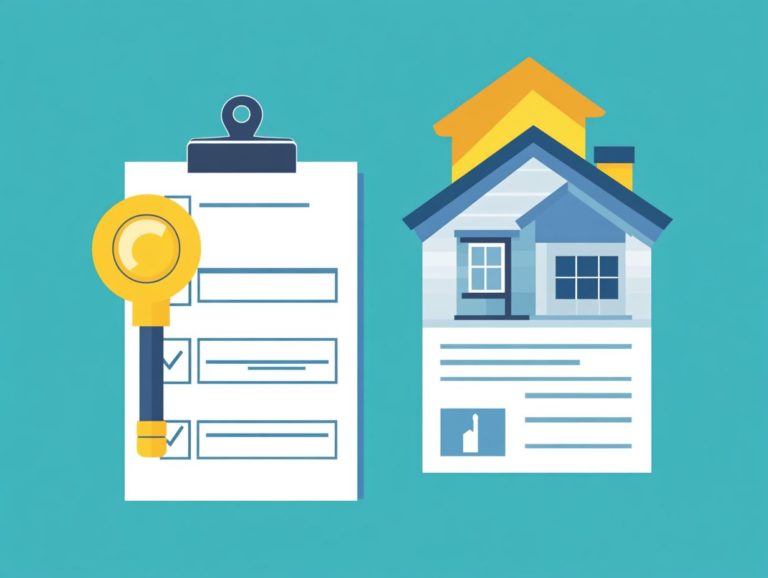How to Analyze Mortgage Offers Like a Pro
Navigating the world of mortgage offers can be overwhelming. However, grasping the essentials will empower you to make informed decisions.
This article delves into the critical components of mortgage offers. It covers everything from what they entail to the key factors you should consider, such as interest rates, closing costs, and various fees.
It also guides you on how to effectively compare offers, negotiate better terms with lenders, and sidestep common pitfalls.
By the end, you ll feel ready to confidently choose the best mortgage option for your future!
Contents
- Key Takeaways:
- Understanding Mortgage Offers
- Key Factors to Consider
- Comparing Mortgage Offers
- Negotiating with Lenders
- Avoiding Common Pitfalls
- Finalizing Your Mortgage Decision
- Frequently Asked Questions
- What should I consider when analyzing mortgage offers?
- How can I compare different mortgage offers?
- Is the interest rate the most important factor to consider?
- Should I negotiate for a better mortgage offer?
- What are some red flags to look out for when analyzing mortgage offers?
- Are there any tools or resources that can help me analyze mortgage offers?
Key Takeaways:
- Understand the components of a mortgage offer, including interest rates, terms, closing costs, and fees.
- Evaluate and compare multiple mortgage offers to find the best fit for your financial situation.
- Negotiate with lenders to secure better terms and avoid common pitfalls when analyzing offers.
Understanding Mortgage Offers
Understanding mortgage offers is essential for you as a homebuyer. They outline the terms and conditions a lender provides for your home loan application.
These offers can differ significantly among mortgage lenders. It is crucial for you to grasp the various elements involved, such as interest rates, loan estimates, and closing costs.
By exploring multiple mortgage companies, you can gain a clearer picture of your options, assess potential savings, and secure the best possible deal.
This guide will highlight the key factors that influence mortgage offers, empowering you to secure better lending terms.
What is a Mortgage Offer?
A mortgage offer is a formal proposal from a mortgage lender that outlines the terms of your home loan. It encompasses essential elements like interest rates, loan terms, and closing costs.
Grasping how these components fit together is vital for you as a borrower. The interest rate whether fixed or variable plays a significant role in shaping the overall cost of your mortgage throughout its duration.
Loan terms, typically spanning from 15 to 30 years, determine how long you have to repay the borrowed amount. This influences your monthly payments.
Closing costs can also make a substantial difference. They often include fees for appraisal, title insurance, and mortgage insurance particularly relevant for FHA and VA loans adding to your initial financial commitment when buying a home.
It s essential for you to carefully review these factors to ensure you make an informed decision.
Key Factors to Consider
When evaluating mortgage offers, several key factors come into play that can significantly impact your financial situation and long-term savings potential.
These factors include:
- Interest rates, which dictate your monthly payment;
- Closing costs, which should be integrated into your overall borrowing expense;
- Your credit score, which can influence the mortgage offers at your disposal.
You should also understand loan terms and the implications of mortgage insurance. Understanding how much you earn versus what you owe can help you make better loan decisions.
Each element plays a crucial role in the borrowing process, and being well-informed can lead to more advantageous financial outcomes for you.
Interest Rates and Terms
Interest rates stand as one of the most crucial elements of mortgage offers. They directly shape the overall cost of borrowing and influence your monthly payments.
You can generally divide these rates into fixed-rate and adjustable-rate mortgages, each presenting its own set of advantages and potential pitfalls. A fixed-rate mortgage grants you the comfort of predictable payments throughout the entire loan term, while an adjustable-rate mortgage may start with enticingly low rates that can fluctuate over time.
The duration of your loan be it 15 or 30 years can significantly affect the total interest paid over its lifespan. Employing tools like an interest rate lock can help you secure favorable rates, while opting for mortgage points might reduce your overall borrowing costs, offering you flexibility in your financing choices.
Closing Costs and Fees
Closing costs include various fees that come up when finalizing your mortgage. They can greatly affect the total cost of your home loan.
These costs typically include lender fees, such as origination and underwriting charges, which cover the processing of your loan application. Escrow expenses are equally vital, as they involve managing the funds and documents necessary for the smooth transfer of your new home.
You should also be mindful of potential costs associated with mortgage insurance. This is insurance that protects the lender if you default on the loan, often required with low down payments, especially if you’re making a smaller down payment.
Reviewing loan estimates is essential; it provides you with valuable insight into these expenses. This enables you to budget effectively and sidestep any unexpected financial strain throughout the home buying process.
Comparing Mortgage Offers
Comparing mortgage offers is a crucial step in your journey to securing the best rate and terms for your home loan.
This process involves meticulously analyzing multiple quotes from a variety of lenders to ensure you make the most informed decision.
How to Evaluate and Compare Offers
To evaluate mortgage offers effectively, focus on key elements like loan estimates and mortgage rates. Also, consider terms linked to each offer, including closing costs and any applicable fees.
By examining these factors, you can gain a clearer picture of the true cost of financing your home. Taking the time to calculate the total loan costs over the life of each mortgage may reveal significant differences in long-term expenses.
Ultimately, understanding these aspects gives you the power to make informed decisions that align with your financial goals, ensuring you secure the most advantageous deal available.
Negotiating with Lenders
Negotiating with lenders is an essential part of securing favorable mortgage terms. It gives you the power to customize your loan agreements, aligning them more closely with your financial situation and savings objectives.
Tips for Negotiating Better Terms
When you re negotiating better terms with a mortgage lender, having competitive quotes and a clear grasp of your financial situation can significantly enhance your leverage during discussions. This preparation gives you the power to confidently advocate for a more favorable interest rate or reduced fees.
Gathering multiple quotes from various lenders serves as an essential benchmark. This insight not only helps you identify the best options but also provides you with solid evidence to support your negotiations.
By effectively communicating your financial health such as your credit score and employment stability you can foster a sense of transparency and trust, which are crucial for reaching an agreement that truly benefits you. Strategic planning and open dialogue are your best allies in achieving optimal mortgage conditions.
Avoiding Common Pitfalls
Avoiding common pitfalls when analyzing mortgage offers is crucial for ensuring that you, as a homebuyer, make sound financial decisions and secure the best possible terms.
By being attentive and informed, you can navigate the complexities of mortgage options and emerge with an agreement that truly benefits your financial future.
Mistakes to Avoid When Analyzing Offers
When you re analyzing mortgage offers, it s essential to steer clear of common mistakes that could lead to unfavorable lending terms or increased costs down the line.
A significant pitfall is fixating solely on the advertised interest rates. While those low rates can be tempting, they often conceal additional costs. Take the time to examine the loan documents thoroughly, ensuring you grasp all the terms, from variable rates to penalties for early repayment.
Don t overlook those closing costs, either; they can result in unexpected expenses that inflate the overall loan amount.
It s wise to consider the long-term implications of varying loan terms. A modestly lower monthly payment could translate to significantly higher total costs over the life of the loan. A comprehensive analysis is absolutely key.
Finalizing Your Mortgage Decision
Finalizing your mortgage decision entails several crucial steps that help you identify the ideal lender and terms tailored to your unique financial situation and needs.
Navigating this process carefully is your key to securing the best deal for your investment!
Take the next step with confidence and secure the mortgage that s right for you!
Steps to Take Before Making a Decision
Before you finalize your mortgage decision, take some critical steps. Review your credit score and understand the loan application process.
Getting pre-approval a process where lenders assess your financial information before you apply for a mortgage can help you secure better loan terms. Check your credit reports for errors that may harm your score.
Familiarize yourself with different loan types. Knowing which ones fit your finances simplifies decision-making.
Gather documents like proof of income and tax returns early. This speeds up pre-approval and strengthens your negotiating position.
Frequently Asked Questions
What should I consider when analyzing mortgage offers?
Consider the interest rate, loan duration, closing costs, and any additional fees. These factors impact your overall cost.
How can I compare different mortgage offers?
Create a spreadsheet to list important details of each offer. Include interest rates, duration, and fees for easy comparison.
Is the interest rate the most important factor to consider?
No, while important, the interest rate isn’t the only factor. Closing costs and fees also play a significant role.
Should I negotiate for a better mortgage offer?
Yes, always negotiate! You might secure a lower interest rate or have certain fees waived.
What are some red flags to look out for when analyzing mortgage offers?
Watch out for high interest rates, excessive fees, and prepayment penalties. Always read the fine print and ask questions if unsure.
Are there any tools or resources that can help me analyze mortgage offers?
Yes, use mortgage calculators and loan comparison websites. Financial advisors can also provide valuable insights.





